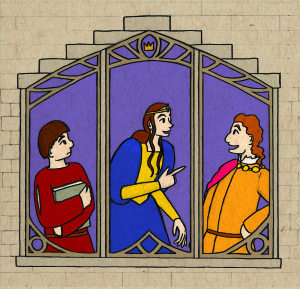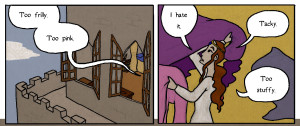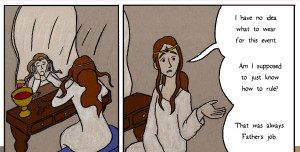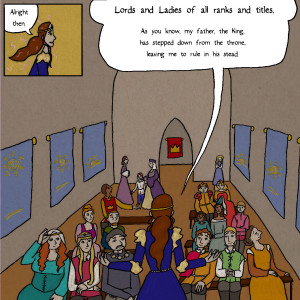A Woman on the Throne
I was an avid consumer of fantasy and science fiction growing up, and some of my favorite stories were about women in sexist societies achieving things that they were told they were not allowed to do, often pretending to be men in order to accomplish those goals. It was a trope I embraced as I found myself in male dominated classes and activities; an idea that I could not only do well, I could do better, that I had to prove something for women everywhere, and at the same time that life would be easier if people thought of me as “one of the guys”. I struggled between trying to shed my femininity and fighting to stand up for it.I'm tired of walking that tightrope.
As a cartoonist I am very aware that parts of my field are heavily male dominated and that portrayals of women are often lacking in nuance and focused more on sex appeal than character. But I have also been delighted to find so many comics, largely independent and self published, that are full of diversity and include complicated, interesting female characters that don't have to hide their gender in order to be taken seriously, characters that can be both feminine and confident, strong and compassionate, characters who are as diverse, multifaceted and complicated as those of us in the real world. A few months ago I finished drawing my first graphic novel, Wit's End, which you can preorder on Kickstarter through Dec 15. It's an all ages fantasy slice of life story about a royal scribe, the princess he works for, her family, friends and staff. It's broken up into five chapters, each telling it's own story, which weave together to create a larger picture of the world and the people in it. I wrote it for my twelve year old self; tried to craft the type of story I was desperately looking for then. I was searching for stories to tell me that it was ok not to be in love with anyone, that I didn't need a male counterpart to be complete, and that I could be a powerful woman without rejecting femininity. I've tried to communicate those messages through my work.When I was writing Wit's End, I knew I wanted Francis, the princess, to be on the throne, ruling, and I didn't want anyone to ever question her position because of her gender. I declared that the crown would be passed to the oldest child, regardless of gender, unless some other factor prevented it. People may question Francis's competence because of her age, the recentness of her ascent to office, or her behavior, but never because she is female. Stories about characters who overcome sexism are powerful and important (and helped me get through rough times in high school), but it is also important to tell stories where sexism isn't an issue, where we model possibilities that are too often unreached in reality.Good intentions aside, it's hard to leave the quiet sexism of our society at the door, even in fictional worlds. In the second chapter of Wit's End Francis is preparing for her State of the Kingdom Address, and on a quest to find the perfect outfit. While working on an early draft of that issue I asked a male friend to read through and give me feedback, and I was interested and distressed by his initial reaction. My friend started giving me tips on how I could make Francis more humorously self-centered and vain, which wasn't at all my intent. Yes, I wanted the scene to be humorous and yes - she is obsessing over her appearance - but ultimately her quest to find the perfect dress was about trying to step into a role that was new to her, to play the part people expected of her, and to anxiously focus on one of the few things that was completely within her control.
A few months ago I finished drawing my first graphic novel, Wit's End, which you can preorder on Kickstarter through Dec 15. It's an all ages fantasy slice of life story about a royal scribe, the princess he works for, her family, friends and staff. It's broken up into five chapters, each telling it's own story, which weave together to create a larger picture of the world and the people in it. I wrote it for my twelve year old self; tried to craft the type of story I was desperately looking for then. I was searching for stories to tell me that it was ok not to be in love with anyone, that I didn't need a male counterpart to be complete, and that I could be a powerful woman without rejecting femininity. I've tried to communicate those messages through my work.When I was writing Wit's End, I knew I wanted Francis, the princess, to be on the throne, ruling, and I didn't want anyone to ever question her position because of her gender. I declared that the crown would be passed to the oldest child, regardless of gender, unless some other factor prevented it. People may question Francis's competence because of her age, the recentness of her ascent to office, or her behavior, but never because she is female. Stories about characters who overcome sexism are powerful and important (and helped me get through rough times in high school), but it is also important to tell stories where sexism isn't an issue, where we model possibilities that are too often unreached in reality.Good intentions aside, it's hard to leave the quiet sexism of our society at the door, even in fictional worlds. In the second chapter of Wit's End Francis is preparing for her State of the Kingdom Address, and on a quest to find the perfect outfit. While working on an early draft of that issue I asked a male friend to read through and give me feedback, and I was interested and distressed by his initial reaction. My friend started giving me tips on how I could make Francis more humorously self-centered and vain, which wasn't at all my intent. Yes, I wanted the scene to be humorous and yes - she is obsessing over her appearance - but ultimately her quest to find the perfect dress was about trying to step into a role that was new to her, to play the part people expected of her, and to anxiously focus on one of the few things that was completely within her control. We talked it through; he finished his first read through and took a second look. Working through it, stepping away from his assumptions about princesses and the supposed shallowness of caring about one's appearance, he compared her struggle to a young King Arthur, trying to figure out how to be king. In subsequent drafts I very carefully reworked the dialog to support that reading and discourage the first, to show Francis as a more complicated character capable of surprising the people who discount her. While I may not be able to control the assumptions that people have coming in, I can do my best to subvert those initial judgments.
We talked it through; he finished his first read through and took a second look. Working through it, stepping away from his assumptions about princesses and the supposed shallowness of caring about one's appearance, he compared her struggle to a young King Arthur, trying to figure out how to be king. In subsequent drafts I very carefully reworked the dialog to support that reading and discourage the first, to show Francis as a more complicated character capable of surprising the people who discount her. While I may not be able to control the assumptions that people have coming in, I can do my best to subvert those initial judgments. Francis likes to be beautiful, and likes to be the center of attention. She enjoys throwing tea parties and playing badminton, and none of her femininity makes her a less competent ruler. She's smart, she cares about her people and her family, and if she's flippant or seems self centered, well, she's young and she's human, and she has a very difficult job she's trying to manage the best she knows how.
Francis likes to be beautiful, and likes to be the center of attention. She enjoys throwing tea parties and playing badminton, and none of her femininity makes her a less competent ruler. She's smart, she cares about her people and her family, and if she's flippant or seems self centered, well, she's young and she's human, and she has a very difficult job she's trying to manage the best she knows how. So much of how we approach fantasy stories (and life) has to do with the expectations we build, the stories we tell ourselves about who we are and how the world works, and I wanted to address that in Wit's End. Sometimes those assumptions about how we should be or expect others to be can lead us astray, and cause us to take actions that are ultimately harmful and reduce our ability to be who we really are. I hope that my book holds a few surprises, that some of the assumptions readers come in with are challenged. I can't change the world with one book, but perhaps I can provide readers with a few more complicated, multifaceted female characters and a world that doesn't penalize them for their failure to be men.
So much of how we approach fantasy stories (and life) has to do with the expectations we build, the stories we tell ourselves about who we are and how the world works, and I wanted to address that in Wit's End. Sometimes those assumptions about how we should be or expect others to be can lead us astray, and cause us to take actions that are ultimately harmful and reduce our ability to be who we really are. I hope that my book holds a few surprises, that some of the assumptions readers come in with are challenged. I can't change the world with one book, but perhaps I can provide readers with a few more complicated, multifaceted female characters and a world that doesn't penalize them for their failure to be men.
 Allison Bannister is a cartoonist currently based in Chicago. She spends her time drawing comics, making coffee and wishing her apartment allowed cats. Her first graphic novel, Wit's End, is currently on Kickstarter at https://www.kickstarter.com/
Allison Bannister is a cartoonist currently based in Chicago. She spends her time drawing comics, making coffee and wishing her apartment allowed cats. Her first graphic novel, Wit's End, is currently on Kickstarter at https://www.kickstarter.com/
